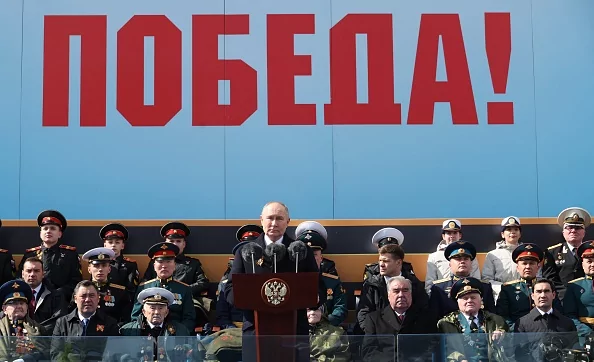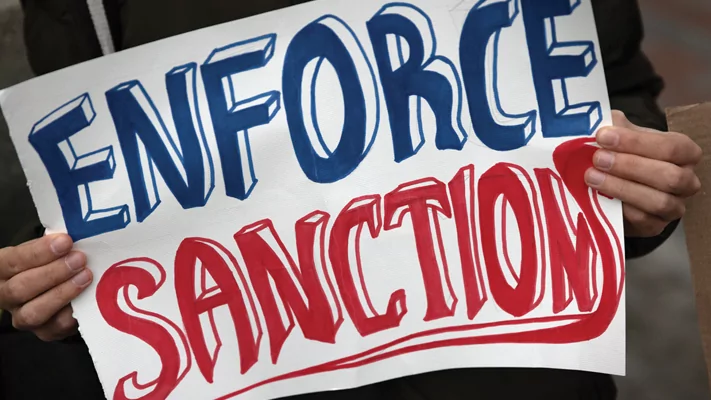Numbers are everywhere in Washington. Budgets, deficits, statistical studies, probability analysis, trade figures, and so on. Sometimes, numbers are being used opaquely, to obscure what’s really going on. It’s an occupational hazard if you work in public policy in Washington, D.C.
Other times, however, the numbers tell a story that is so obvious it’s downright funny. Take the sales of semiconductors from the United States to Kazakhstan: Between 2021 and 2022, it went up nearly 100,000 times, according to the Senate Permanent Subcommittee on Investigations.
That’s not a typo.
There is no mystery as to what happened here. Companies in Kazakhstan were helping its next-door neighbor, Russia, evade U.S. sanctions after Russia’s invasion of Ukraine.

For those who don’t know, semiconductors are materials that fall somewhere between a conductor and an insulator. And they are used in countless technologies, from everyday household items such as smartphones and washing machines to military equipment, including drones, radios, missiles, and armored vehicles, and cyber warfare.
In other words: Many of these items are vital to Russia’s military efforts, and Russia is not capable of producing the grade of these products that it needs on the scale the war requires. Indeed, while Russia has tried to ramp up its domestic production, the semiconductors it can produce are decades behind the technology available in the West and are not adequate replacements.
Because of this, on Feb. 24, 2022, the same day as Russia’s invasion of Ukraine, the U.S. Commerce Department leveled heavy sanctions on Russia, including on semiconductors and other equipment that could also be put to military use with the goal of “technologically isolating Russia and degrading its military capabilities,” according to Deputy Commerce Secretary Don Graves. Newly restricted items also included “computers, telecommunications, information security equipment, lasers, and sensors.”
The U.S. was not alone in leveling such sanctions. The European Union, the United Kingdom, Japan, Taiwan, Singapore, South Korea, and other U.S. allied countries took similar actions. These sanctions have been repeatedly updated, yet a study by the Kyiv School of Economics showed that over 1,000 Western components have been found on the battlefield after studying downed Russian military equipment.

But this is far from a simple problem with Kazakhstan, a poor former Soviet republic of relatively little geopolitical importance. While Kazakhstan’s relative increase is the most eye-popping, there are many other, even more serious, offenders, including Armenia, Finland, Georgia, and Turkey. But one country eclipses them all: China.
A major study from earlier this year by the American Enterprise Institute makes this very clear, saying that “Russia is still importing primarily Western chips, though it is doing so via third countries. China is by far the most important source of chips for Russia.” It goes on to say that while other countries contribute to Russia’s sanctions evasion, “over 80% of the chips Russia has purchased since the start of the war have come directly from China.” The Kyiv School of Economics agreed, saying, “China plays a key role — as an intermediary for shipments from other places as well as an alternative supplier.”
Speaker Mike Johnson (R-LA) was plainly correct when he said in April, during the passage of the Ukraine, Israel, and Taiwan aid bill, that he thinks China, Russia, and Iran “are in coordination,” when it comes to Ukraine. Indeed, they are. Russia is doing the dirty work, while Iran, which is under strong U.S. sanctions just like Russia, is selling Russian drones on a mass scale and, more recently, short-range missiles. Meanwhile, China is taking up the lion’s share of getting Russia the technological pieces it needs to continue the fight. Johnson didn’t mention North Korea, but it is in the mix, too.
Put another way: The failures of the U.S. to restrict Russian access to these kinds of duel-use technologies sufficiently are not simply a failure of policy on the Russia-Ukraine war but a failure that empowers and emboldens all of America’s foes, which indeed are working closely to undermine the U.S. and its allies at every turn. Letting Russia get away with this also helps and encourages China, Iran, North Korea, and anyone thinking of joining their side, all while they pocket additional money for themselves.

But why is this happening? Sure, there may be a tiny handful of businessmen in the U.S. or in some of our allied countries that are willing to make a quick buck on Ukrainian blood, but the vast majority would prefer not to. Even putting aside personal or corporate moral sensibilities, it’s a PR nightmare. Sen. Richard Blumenthal (D-CT) has criticized U.S. chip manufacturers for not doing more, and industries can’t be happy about being targeted by the senator’s subcommittee.
But while companies are supposed to screen for sanctions evasion, the increasing sophistication of Russian countermeasures and the relatively light hand aimed at duel-use semiconductor technology makes this very difficult. Actions any company takes could easily be undermined by companies that don’t, as most of these parts are interchangeable. And while China is the largest indirect supplier of U.S. technology to Russia, the multiplicity of problematic jurisdictions makes the problem harder still.
To be sure, there have been some efforts to stem this problem. The U.S. and its allies have heavily leaned on the United Arab Emirates, for example, to crack down on products flowing from its jurisdictions to Russia, the success of which is as of yet unclear. And there are undoubtedly many conversations going on with many countries trying to reverse Russia’s gains in terms of evading U.S. sanctions.
Also, the U.S. has also made changes in how export control laws have been enforced. For example, the Justice Department has signaled it is not happy with the traditional screening approaches and has begun to enforce sanctions and export controls in a manner similar to U.S. Foreign Corrupt Practices Act enforcement. This is the law that bans U.S. companies from bribing foreign officials to further their business interests. It has long been prosecuted under a “high probability standard,” in addition to an “actual knowledge” standard. In other words, if a company knew that there was a “high probability” that sanctions would be circumvented, it could be found to be in violation of the law, even if it did not know for certain such laws would be violated.
But most enforcement actions are not criminal but civil, and the DOJ does not handle most enforcement actions of export control laws. That job falls to the Commerce Department.
To its credit, the Commerce Department is taking some action on this issue as well. In a speech earlier this year, Assistant Secretary for Export Enforcement Matthew Axelrod outlined a number of cross-agency measures and enforcement actions taken against illicit exports, particularly focused on Russia, China, and Iran, some of which have certainly played some role in slowing the flow of U.S. technology to foes.
Perhaps most importantly, the Commerce Department implemented a new policy in which it sends “red flag” letters to companies engaged in trade that could reach Russia and cautions them to do increased due diligence and expand export screening efforts when engaging with certain parties, as well as requests companies voluntarily stop engaging with customers that present serious diversion concerns. This intermediate step, taken before an “is informed” letter, which requires companies to obtain licenses before making such sales, allows the Commerce Department to take more, and faster, actions to deter actions that could lead to Russia getting vital American technology, and in the industry, this sends real shock waves.
It is true that there is a general consensus that our actions are having some effect, making it more expensive for Russia, in particular, to obtain needed semiconductors and related technology. AEI’s study found that “successive rounds of sanctions have forced Russia to pay nearly twice as much for semiconductors as it did before the war.”
But it nonetheless remains clear that what is being done is inadequate. Current U.S. policies are not stemming the flow, or even significantly minimizing the amount, of semiconductors Russia has been able to obtain, as was hoped when the U.S. leveled sanctions after the invasion of Ukraine. New policies are badly needed. Some would require new laws, while others merely require a new focus on existing actions the government can already take.
An example of the latter goes back to the “high probability standard” discussed above. Only the DOJ currently uses this standard, but a regulatory overhaul in 1996 allows the Commerce Department to take administrative action under the same “high probability standard.” Yet this standard is not often applied. In private conversations with several current and former Commerce Department officials, few, if any, were even fully aware that it was an option and continued to prosecute cases under the much higher “actual knowledge” standard.
If the Commerce Department were to use this legal standard, or even threaten to, in actions against possible violators, it would likely reorient the industry to be more strident in its approach to sanctions evasion. It would send a wide signal that no one is likely to lose market share by erring on the side of caution and that the legal implications of doing otherwise are not worth it. Indeed, it even removes a roadblock in which industry leaders may be afraid not to sell products due to lawsuits. Instead, using such a standard would provide industry actors with a legal basis to refuse to ship semiconductors to problematic destinations pending deeper investigations.
Another approach would be to look to history.
During World War I, the British realized that a large amount of products destined for neutral countries wound up in enemy hands and that pinpoint inspections for contraband were not sufficiently effective. Instead, the British focused on maintaining levels of exports of key materials to prewar levels that would not allow the Germans to make up for lost resources and artfully avoided the near-impossible task of tracking and verifying actual end uses and end users in global trade, which necessarily relies in the first instance on self-reported data.
Switzerland is usually remembered as being the “neutral” country during World War II, but the reality is more complicated than it being an untouched neutral island in the middle of a sea of war. Switzerland, in fact, traded heavily with the Germans under the Nazi regime. But eventually, after some smart diplomacy, the Allies were also able to limit overall Swiss exports to the Axis as well.
A similar approach could be used now, disallowing U.S. exports of semiconductors to countries that are believed to be evasion risks beyond the levels that predated the Russian invasion. This would not be a cure-all. Obviously, Russia could still obtain the prewar levels of semiconductors, but it would stop the kind of obvious problems, such as the increase of nearly 100,000 times in exports to third-party countries, as was the case with Kazakhstan, likely significantly increasing the price in Russia and perhaps creating an overall scarcity in Russia as well.
Of course, one might get some industry pushback on this, which will, for obvious reasons, be skeptical of slowing the growth of the market for products. This leads to another policy aid: the creation of a United States Commission on International Sanctions Evasion, patterned on the United States Commission on International Religious Freedom.
For those who don’t know, USCIRF is an independent commission whose commissioners are appointed by administrative and congressional leaders from both houses in both parties. Its mandate is to investigate violations of religious freedom internationally and to make policy recommendations to the president, the secretary of state, and Congress.
The reason for this is multifold, but it boils down to the fact that while religious liberty is an important value for America and often is a harbinger for larger problems on the horizon, it is also an extremely sensitive issue diplomatically, and often, these important concerns are left out of high-level discussions, or even reporting, due to not wanting to anger foreign leaders. USCIRF can highlight religious liberty abuses, without the baggage of the State Department doing so, and keep these concerns at the forefront of the minds of diplomats, Congress, and the public. While this might seem small, it has changed the nature of numerous discussions concerning generally friendly countries such as Turkey, Egypt, and India in ways that otherwise may have gone under the radar and also highlights the systemic abuses of foes, such as Iran, Russia, and China.
Taking a similar approach for sanctions evasion has huge upsides. It would allow a high-profile commission to point to bad actors, be they companies, countries, some combination, or any other source, without the political interference from members of Congress who worry about businesses in their districts and without worrying about ambassadorial niceties of bringing these issues up in public. It would also be able to point to holes in sanctions laws and policies quickly: USCIRF, for example, creates annual reports but also issues op-eds, press statements, podcasts, and similar items for public consumption throughout the year. A sanctions commission could do likewise. This could have an enormous impact on the debates in Congress, in the State Department, and in the media.
What’s more, its significance could last beyond the immediate crisis. America’s primacy in financial, technology, and currency markets makes its sanctions regime enormously powerful compared to any other country, or even any other group of countries, on the planet. But while they certainly have laudable effects, they do not live up to their full potential due to excessive political considerations, the slowness by which they are implemented, and the quickness with which America’s foes find their way around them. A sanctions commission wouldn’t fix any of these problems, but it could serve as a way to lessen all of these problems.
CLICK HERE TO READ MORE FROM THE WASHINGTON EXAMINER
It is not hyperbole that the outcome of the Russia-Ukraine war will likely have a greater impact on world events than any other single issue we’re discussing today and will set the tone for what happens next. Large, bipartisan majorities in the House and the Senate have helped keep Ukraine in the battle by providing it with the tools it needs to combat the Russians. But so far, the U.S. has done too little to stop the flow of American technology to the Russian war machine. And much like the wider Ukrainian conflict, how the U.S. handles this will have ripple effects in how it deals with similar problems in future hot or cold wars.
Actors at all levels in Washington, including in the administration and in Congress, should endeavor to make further progress on this issue sooner rather than later.
Clifford Smith is a former congressional staffer and an attorney.
